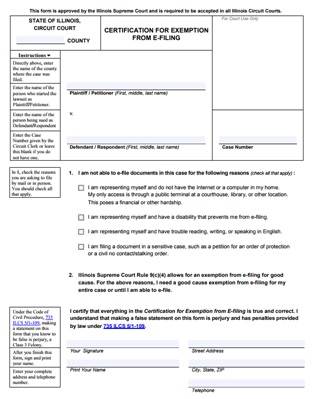December 27, 2017
Attorneys and litigants filing documents with the Illinois Supreme Court and Appellate Courts, in civil cases, have been required to do so electronically since July 1, 2017. The requirement for e-filing in civil cases will apply to circuit courts across the State on January 1, 2018, pursuant to Illinois Supreme Court M.R. 18368 (eff. Jan. 22, 2016). Most court users will transition from conventional to electronic filing with few problems and minimal disruptions. However, mandatory e-filing will prove challenging for many self-represented litigants ("SRLs"), who do not have the resources, technology, or ability necessary to navigate e-filing. The requirement may prevent them from having full access to our courts.
Illinois Supreme Court Rule 9(c) (Ill. S. Ct. R. 9(c) (eff. Dec. 13, 2017)), exempts certain documents from e-filing and includes a good cause exemption in subsection (4). On December 13, 2017, the Illinois Supreme Court amended Rule 9(c)(4), to define the nature of "good cause" and detail the procedures for obtaining such an exemption.
Rule 9(c)(4) now reads:
“Documents filed in a specific case, upon good cause shown by certification. Good cause exists where a self-represented litigant is not able to e-file documents for the following reasons: no computer or Internet access in the home and travel represents a hardship; a disability, as defined by the Americans with Disabilities Act of 1990, that prevents e-filing; or a language barrier or low literacy (difficulty reading, writing or speaking in English). Good cause also exists if the pleading is of a sensitive nature, such as a petition for an order of protection or civil no contact/stalking order.
A Certification for Exemption from E-filing shall be filed with the court—in person or by mail—and include a certification under 1-109 of the Code of Civil Procedure. The court shall provide and parties shall be required to use a standardized form expressly titled ‘Certification for Exemption from E-filing’ adopted by the Illinois Supreme Court Commission on Access to Justice.
Judges retain discretion to determine whether, under particular circumstances, good cause exists without the filing of a certificate and the court shall enter an order to that effect. Judges retain discretion to determine whether good cause is shown. If the court determines that good cause is not shown, the court shall enter an order to that effect stating the specific reasons for the determination and ordering the litigant to e-file thereafter.”
The standardized certification to which the amended rule refers may be found on the Illinois Courts’ website. The certification lists the Rule’s different bases for good cause. A SRL (or attorney in cases of a sensitive nature only) may select the applicable box on the certification form for establishing good cause, sign under penalty of perjury pursuant to 735 ILCS 5/9-101 (West 2014), and submit it to the clerk along with any pleadings to be filed. The clerk must accept the certification and, upon its filing, the good cause exemption will automatically apply without the need for court approval of the exemption.
Additionally, under Rule 9(c)(4), judges have discretion to sua sponte order that a litigant be exempted from e-filing without a certification. Where there is good cause, a judge may order that a party is exempt from e-filing, which would allow that party to file physical documents with the clerk. This authority will be especially useful in high-volume courtrooms, where a defendant is directed to appear for the first time in person on a certain date, and wishes to file documents.
Finally, under Rule 9(c)(4), judges also retain discretion to assess the continued existence of good cause. Where the good cause basis for the exemption no longer applies, a judge may order a litigant to e-file thereafter. This authority will serve to prevent any possible abuse.
E-filing presents an opportunity to increase access and efficiency for the majority of court users. However, the ability to use new technologies is not universal. The amendment to Rule 9(c)(4) signifies the desire of the Illinois Supreme Court to avoid the inadvertent creation of new barriers to our courts through e-filing. The exemption will allow SRLs to file documents in person or by mail. The exemption does not undermine the Illinois Supreme Court's strong and laudable efforts to modernize and improve the efficiency of Illinois courts. It does, however, offer a failsafe for the most vulnerable Illinois residents who might otherwise struggle to access the courts and aligns Illinois practice with that of the rest of the country. In adopting the amended rule, the Court furthered its goals of establishing a modern, cost-effective, and efficient case management system, while protecting the needs of the most vulnerable litigants who would struggle to adapt.